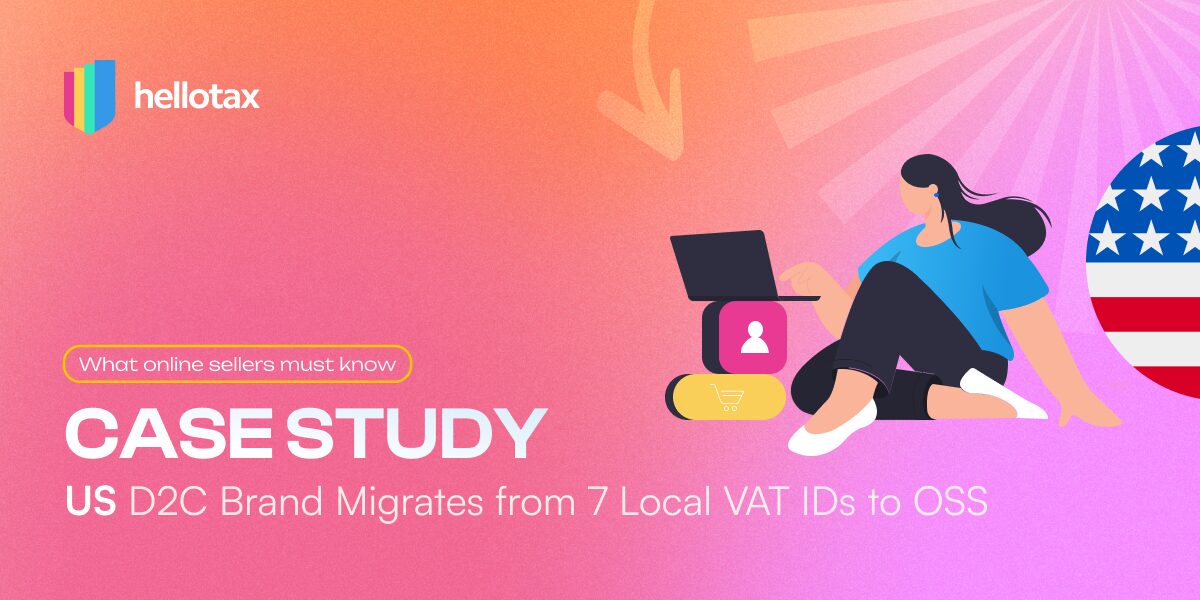The increasing importance of the online market results in tax law consequences. The taxation of the generated sales is particularly demanding. For those, different taxation principles can be applied depending on the transaction scenario. In order to avoid stumbling blocks under tax law with regard to the e-commerce VAT to be paid, a brief overview is given below and important aspects as well as future changes are pointed out.
Antonia Klatt
Last Updated on 14 September 2020
VAT in e-commerce: From when and for whom?
The taxation principle is based on which parties are involved in a transaction. As a rule, VAT is payable in Germany if a transaction is concluded between two companies resident in Germany that are not small traders. As soon as an actor is resident abroad, special regulations arise which change the taxation of a transaction.
For online transactions between companies and private individuals, sales tax is usually charged. In exceptional cases, the company (online merchant) will not charge VAT on the e-commerce transaction, as it makes use of the small business regulation.
Regarding the EU VAT reform
In addition, the EU-wide VAT reform in the coming year will be discussed. The goal:
- more income through VAT payments and a
- reduction of compliance costs.
In order to achieve this and to comply with all the guidelines, it is important for the companies concerned to look ahead. This would ensure a stress-free transition. However, a closer look reveals that the relevant innovations also bring challenges.
B2B: E-Commerce VAT and Reverse Charge
The Reverse charge mechanism is understood to be the reversal of the tax liability. But what does this mean? Reverse Charge is a VAT regulation that allows actors to convert the taxation of VAT.
In concrete terms, this means that the service provider, who is basically responsible for the calculation and payment of VAT, transfers this obligation to the purchaser (service recipient). Thus the service recipient has a tax liability to the tax office.
However, it is important to note that the reverse charge procedure can only be used for business transactions within the EU. It is also assumed that the parties involved in a business transaction are entrepreneurs. A B2B transaction is therefore a mandatory requirement. Otherwise, the reverse charge procedure cannot be applied.
But what is the advantage? After all, the VAT must be paid. The aim of this regulation is not to minimize the costs of the entire transaction. After all, the company subject to VAT can normally claim the e-commerce turnover tax paid as input tax. Rather, the application of this procedure is intended to reduce the administrative burden for all parties involved. This ensures that no contact with foreign tax authorities is necessary.
E-Commerce-Umsatzsteuer beim Online-Handel in der EU / im EWR: Lieferschwelle
The basic framework of the taxation principle is based on the location of the online merchant’s warehouse. This means that the location of the services provided, i.e. the place where the order is sent, is decisive for taxation. The simple case here is if the goods are shipped from Germany and the online merchant is also located in Germany. Consequently, the German VAT is calculated and paid.
If, however, the goods are shipped from an EU country or the European Economic Area, special features under VAT law arise. This is where the so-called VAT thresholds comes into play. This is understood to be a threshold value, measured according to turnover, which can either be exceeded or fallen short of by the online retailer.
In both scenarios tax obligations arise. In the event that the delivery threshold is not exceeded in a calendar year, the mail order company can decide in which country it wants to tax the transaction with the e-commerce VAT. From a purely economic perspective, it makes sense to tax the transaction in the country with the lower VAT rate.
The clou is: The sold goods become cheaper for the end consumer. However, if the delivery threshold is exceeded in the recipient country, the online mail order company/online seller is obliged to charge the order with the VAT rate applicable in the destination country. Accordingly, the principle of choice does not apply here and at the same time tax obligations arise. Thus, the online mail order company is required to apply for its own VAT ID in the destination country and to carry out all associated obligations, such as the regular filing of advance VAT returns.
E-Commerce VAT 2021: What’s new? The VAT reform in detail
The changes that will come into force in connection with the aforementioned VAT reform are manageable, but should have a major impact on international trade.
What is new: If companies from third countries sell their products with a value of less than 150 EUR via an online marketplace, an online store or similar platforms, the same VAT rules apply as for suppliers or vendors. This means: Here the e-commerce VAT becomes due!
The operators of the platforms are then responsible for the payment of the said tax. They must also ensure that the corresponding sums can be traced at any time. If you want to be on the safe side here, you should keep meticulous records of the relevant sales or transactions and document the amounts – also in a way that is understandable for third parties.
In addition – with the aim of further simplifying international trade – special thresholds, which in turn were dependent on the specifications of the respective country, are to be dispensed with in future. There will then be no need for registration if the individually determined amount concerned is exceeded.
The fact that the individual thresholds are to be waived does not mean, of course, that there will be no upper limit after 2021. However, in order to proceed according to a uniform pattern here as well, there is a single threshold value which then applies to trade within the entire EU. This is 10,000 euros (net) per calendar year (based on the period of service provision and the year before).
According to this rule, if the value is exceeded, the tax must be paid in the country of the purchaser. The enterprises concerned have for this however now a partner in their country, which applies to tax payments into all EU countries. The corresponding procedures are thus simplified even further, since one office takes care of all payment runs.
Do these new regulations only apply to B2B business?
In view of the new regulations surrounding the EU’s VAT reform, a distinction must be made between two categories: B2B and B2C.
With regard to classic B2C business, the above-mentioned innovations will probably take effect from 01.01.2021, but perhaps only six months later.
On the other hand, those who market B2B still have at least until 01.01.2022 to adapt to the new conditions. Deliveries are still exempt from mail-order VAT until this date, provided they meet the relevant conditions.
Will the VAT reform possibly be postponed?
Corona has upset the world. This also applies to the field of e-commerce and to the world of taxes, among others. Currently, the EU Commission is proposing to postpone the reform by six months.
Because, as already mentioned, the new variant offers many advantages, but must also be adequately prepared. In order to give the companies concerned enough time to adapt to the new regulations and circumstances, it is possible that they will give in at short notice. After all, the Corona crisis in recent months has meant that numerous companies have had to restructure their resources and plan accordingly.
Only a few of them have probably succeeded in dealing in detail with questions concerning documentation obligations, value-added tax and local contacts in order to be able to actually start on the basis of the new regulations from January 1, 2021.
Conclusion
The increasing e-commerce trade creates different possibilities of distribution. For example, it is easy for online retailers to address international target groups with their products and win them as customers. Thus, the e-commerce business can be completely scaled up.

Book a free consultation
Our VAT experts are happy to help you. Book a free consultation today!
This does not only increase the turnover, but also the obligations and duties that are connected with online selling in Europe.


